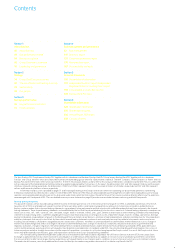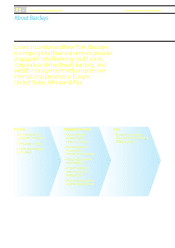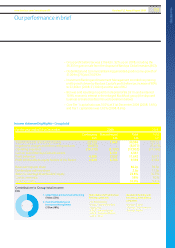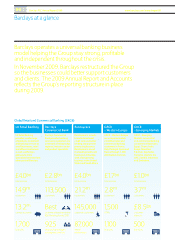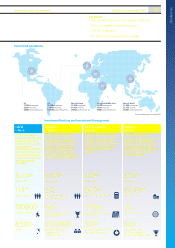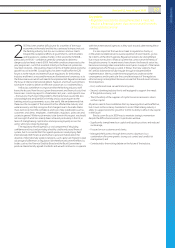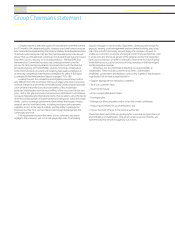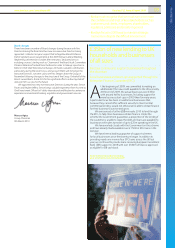Barclays 2009 Annual Report Download - page 9
Download and view the complete annual report
Please find page 9 of the 2009 Barclays annual report below. You can navigate through the pages in the report by either clicking on the pages listed below, or by using the keyword search tool below to find specific information within the annual report.
www.barclays.com/annualreport09 Barclays PLC Annual Report 2009 07
Key points
– Regulation needs to be strengthened but it must not
result in a financial system that cannot serve the needs
of the global economy
2009 has been another difficult year for a number of the major
economies in the world and this has continued to impact not just
the banking industry, but also our customers and our clients.
Despite the exceptional efforts of governments, central bankers
and regulators to stabilise matters in the second half of 2008 –
particularly in the UK – confidence generally continued to decline to
dangerously low levels in early 2009. And while conditions improved as the
year progressed – such that essential stability in the financial system has
now been restored – the resulting impact in terms of higher global economic
growth has still to be felt. Good progress has been made within the G20
forum as to the nature and extent of future regulations for the banking
industry and there is a reasonable measure of international consensus as to
the future measures which will need to be implemented. Regulation remains
the focus of intense international debate, however, and much work remains
to be done in order to deliver an effective solution on a co-ordinated basis.
At Barclays we believe it is important that the banking industry itself
learns the lessons from the crisis given the economic and financial costs that
have arisen. I said in my report to shareholders last year – and I repeat it now
– that we very much regret the problems that banks have caused. We also
acknowledge and are grateful for the help and assistance given to the
banking sector by governments across the world. We are determined that
there must be no repeat of the turmoil that has affected the industry and
wider economy, and fully recognise that changes have to be made. Banks
must earn once more the confidence and trust of key stakeholders such as
customers and clients, employees, shareholders, regulators, politicians and
society in general. While much remains to be done in this respect, we should
not lose sight of what has already been achieved, particularly in the UK, in
terms of strengthening capital ratios and improving liquidity across the
sector, whilst also reducing leverage.
The regulatory reform agenda is a vital component of rebuilding
confidence and trust and providing a healthy, stable and sound financial
system, but it is essential that this agenda produces a level playing field
internationally. Both financial and human capital are mobile and in the
absence of internationally agreed standards, such capital will migrate to take
advantage of differences in regulation. We therefore welcome the efforts by
bodies such as the Financial Stability Board and the Basel Committee to
produce internationally agreed standards and we will continue to co-operate
with these international agencies as they work towards determining these
standards.
It is also important that we do not seek to regulate too hastily or,
in the understandable desire to avoid a repetition of recent events, go too
far in terms of the reform agenda. Regulation needs to be strengthened
but it must not result in a financial system that cannot serve the needs of
the global economy. As recent events have shown, the financial sector has
become increasingly interconnected in recent years in support of the trends
in globalisation which have occurred. It follows that new solutions must
be carefully balanced and fully thought through and agreed before
implementation. We must take the time properly to understand the
consequences and in particular the cumulative impact of the regulatory
reforms being contemplated. We must ensure that the end result achieves
three objectives:
– First, a safer and more secure financial system;
– Second, a banking industry that is well equipped to support the needs
of the global economy; and
– Third, the ability of the suppliers of capital to earn an economic return
on their capital.
All parties need to have confidence that any new regulation will be effective,
but it must not be so heavy-handed as to restrict the banking industry’s
ability to support economic growth or to limit its ability to attract new capital
in the future.
Barclays own focus in 2009 was to maintain strategic momentum
despite the difficult environment. In particular, we have:
– Significantly strengthened our capital and liquidity positions and reduced
our leverage;
– Focused on our customers and clients;
– Managed the business through the economic downturn, by a
combination of income growth, strong cost control and careful risk
management; and
– Contributed to the evolving debate on the future of the industry.


